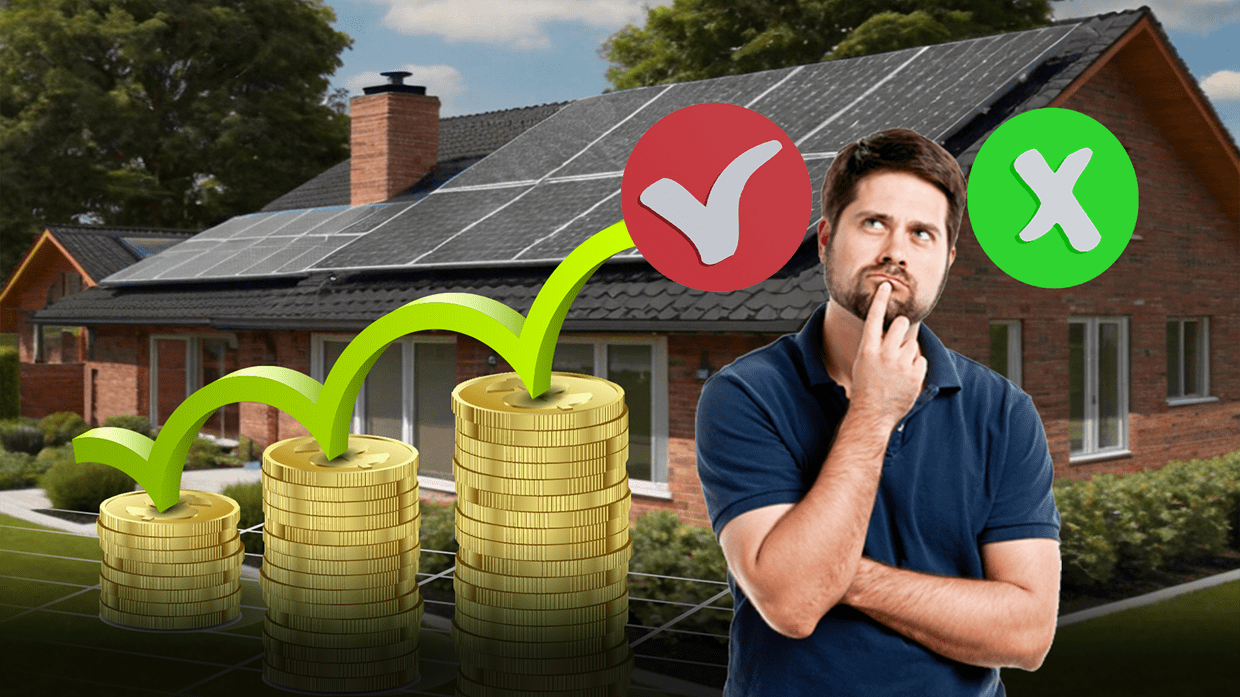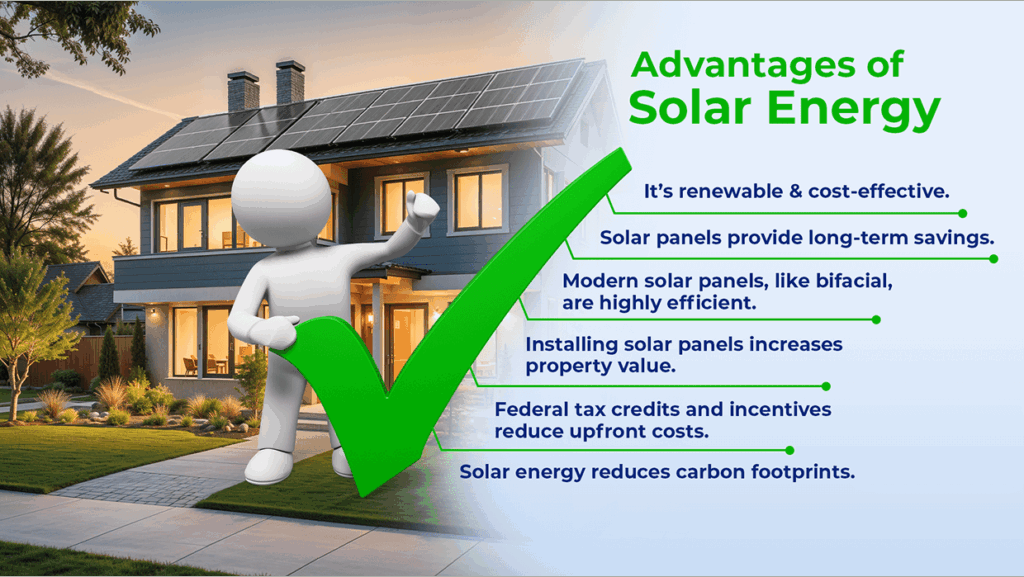- Updated On: July 18, 2024
Are Solar Investments Worth It or Not?
Among the renewable energy sources, the most trending one is solar energy. But the question is, are solar panels worth it? Solar systems for homes are reliable systems and have helped homeowners minimize the use of central electricity and significantly reduce their electricity bills. This article explores whether investing in solar energy is worthwhile, highlighting the benefits and overall savings for homeowners and commercial buildings.

Advantages of Solar Energy
Solar energy offers several advantages. It’s a renewable and sustainable energy source, reducing reliance on fossil fuels and lowering greenhouse gas emissions. Solar power systems can significantly reduce electricity bills and provide energy independence. They require minimal maintenance and have a long lifespan. Additionally, solar energy can be harnessed even in remote locations, making it a versatile solution. With technological advancements, the efficiency and affordability of solar panels continue to improve, making solar energy an increasingly viable option for homes and businesses.
Long-Term Saving Solution
If you live in one of the best states for solar that offer solar incentive programs, you should switch to solar and start saving. You can use electricity generated by solar panels, which reduces traditional electricity bills. Moreover, you can sell excessive energy generated by solar panels which increases the buyback opportunities like feed-in tariffs and power purchase agreements.
Best solar panels also improve the overall ROI and increase property value. Long-term saving makes it a reliable and evergreen choice to get better financial transparency and stability.

Solar Panel Installation Costs
The upfront installation cost of solar panels is relatively high. Solar loans and solar leasing offer the possibility of reducing costs, making solar investments affordable. Financing can be obtained for the purchasing of solar systems, and then the cost is divided over several years through regular instalments for certain periods.
In addition, the federal tax credit makes solar energy affordable because it reduces the upfront cost of solar energy systems and improves the return on investment.
Higher Efficiency
Modern solar panels, like bifacial solar panels and thin film solar panels, are much more efficient than the older types. These types enable homeowners to get the most out of their investment because of their ability to capture sunlight from both sides. By using energy-efficient solar panels, you can generate more electricity because they are capable of converting maximum sunlight into usable electricity.
Solar Payback Period
The point at which one can save an equal or the same value of the amount spent on the installation of the solar panels is referred to as the solar payback time. Usually, it takes from 6 to 10 years to be paid back, depending on the location, energy usage, and possible subsidies. This is economical because after the payback period, electricity generated from the solar panels is almost free, and therefore, there are significant savings in the long run.
Increase Home Value
Best solar energy systems add value to the house since people are willing to pay more for them. Research indicates that homes having solar energy systems have a better selling price compared to those who do not have a solar energy system. Potential customers see solar panels as worth investing in because they can reduce electricity rates as well as the quality outcome of conserving the environment.
Reduce Taxes
Like the homeowners, commercial solar can also utilize federal tax credits to finance their PV system. Also, many states offer tax credits for solar installation and property tax exemptions. For instance, if you install a solar system worth $20,000 with 30% federal ITC, they can claim $60,000 tax credits. Thus, you can have savings in long run.
Environmental Impact
Solar is a sustainable and eco-friendly source of energy as compared to conventional energy sources since it has less contribution to the greenhouse effects. By going solar, you can contribute to combating climate change. Solar panels reduce carbon footprints and make you energy-independent.
Is Solar Right for You?
Finally, at this point, one can know if installing solar panels is worth it or not. Location of the building, energy usage, existing incentives, and financing are some of the considerations that one has to undertake. The savings are much higher in sunny areas of U.S. where electricity rates are high making it a good investment.
There are countless advantages of installing solar panels, which makes it a right choice for everyone. Besides, the initial capital is easily achievable with the right solar financing solutions.
Factors To Consider Before Going Solar
You may want to know about important factors to consider before going solar. Some of these factors includes:
If you live in areas with high electricity bills, installing solar panels can be a great choice for you because it can offset high electricity bills.
Upfront solar cost is comparatively high, but several financing options are available to make it more budget-friendly. This includes solar loans, solar leases, and more. Thus, it’s essential to consider your budget and other financial options before going solar.
Some states are providing rebates and incentives, which makes solar worth it. This reduces the upfront cost of solar systems and helps with federal tax credits.
One of the important points to notice is that you have to select location with exposure to excessive sunlight for installing solar panels. By choosing a location with better sunlight, your solar panels can generate more electricity.
Conclusion
Installing solar panels allows you to get financial stability with better savings in the long run. You can save with solar panels by generating power or selling excessive energy back to the grid. In short, solar financing is a wise choice because it’s a profitable investment that provides you with all-around benefits. From increasing your home’s value to saving you from expensive electricity bills, it is reliable.
Are you in search of a reputable solar company near you? SolarSME is an expert residential solar installer . Request a free quote and take a step towards a sustainable future with us.
Related Articles:
A home solar lease allows you to use the solar energy produced by the solar panels to reduce or even eliminate your electricity costs, while the leasing company retains ownership of the panels on your roof. However, it's essential to conduct thorough research and tackle any leasing arrangement with an open mind.
Solar loans are a cost-effective solution for installing solar panels on your home or business. However, many are unsure about their functionality and the benefits they might derive from this type of solar financing.
It may require an upfront cost to install solar panels, however, there are various solar financing options. Explore the best option . between solar lease vs buy and make an informed choice.



